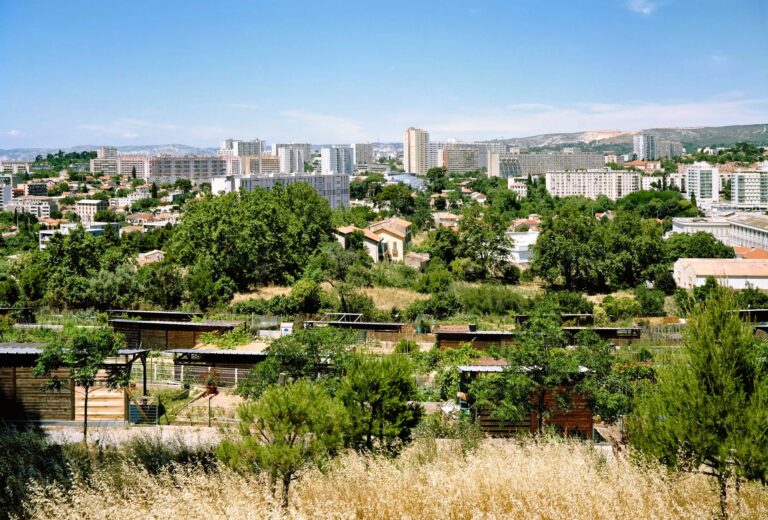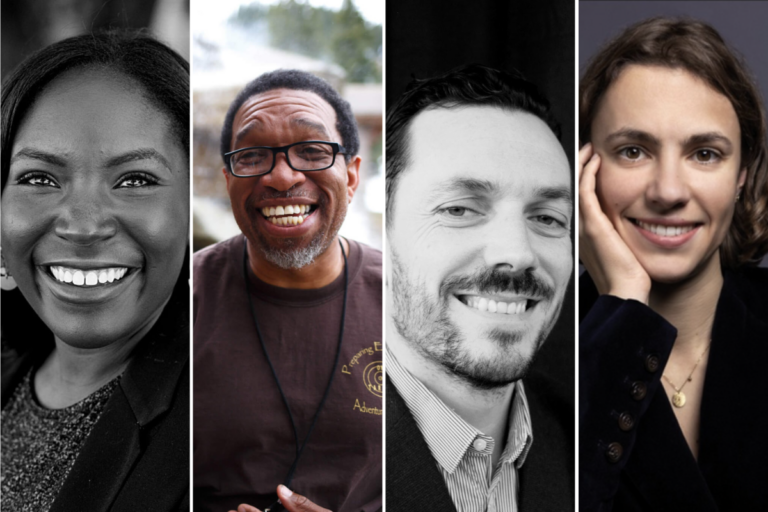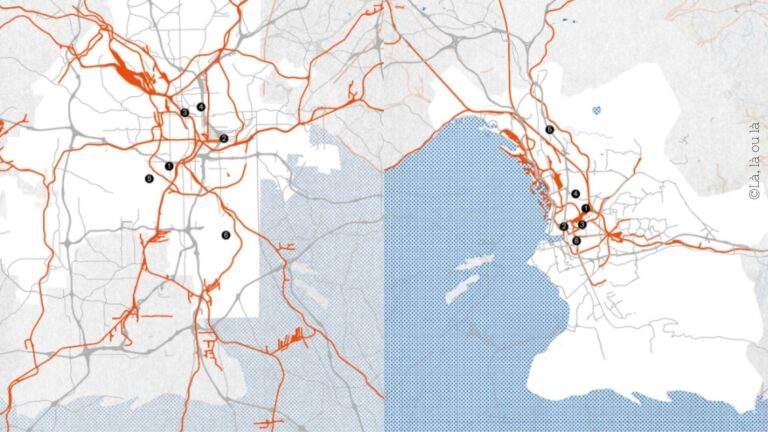
Cities and Countryside: How To Feed Cities?
Panel Discussion, Table ronde
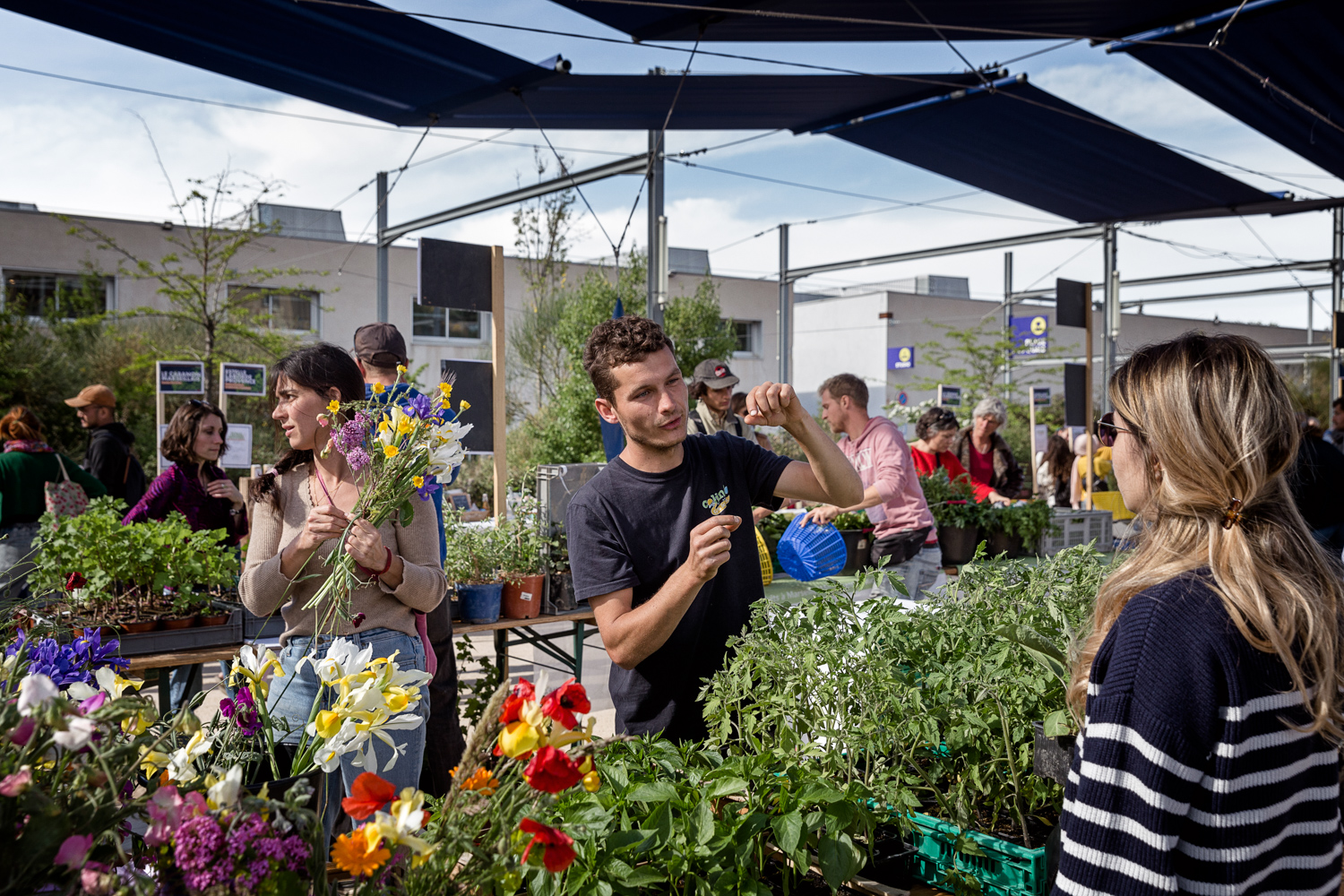
© Pierre-Yves Brunaud
Friche La Belle de Mai
41 Rue Jobin, Marseille, France
13003
April 24, 2023
J.Olu Baiyewu, Director of Urban Agriculture for the City of Atlanta, was invited in Marseille in April 2023, as part of the City/Cité program hosted by Villa Albertine and Terres Communes (April 11 – May 24, 2023), an event co-produced by Le Bureau des Guides du GR2013 and Cité de l’Agriculture, in collaboration with Friche la Belle de Mai. This interdisciplinary initiative offered a series of conferences, workshops, and public walks over the course of more than a week, complementing Sébastien Marot‘s exhibition « Taking the Country’s Side / Prendre la clé des champs » (Agriculture & Architecture).
During his time in Marseille, J.Olu Baiyewu took part in a radio panel discussion on the theme « Cities and Countryside: How to Feed the Cities? » alongside Sébastien Marot, Carolyn Steel, Emmanuel Perrodin, Laure Gaillard, and other guests. This radio panel was hosted by Radio Grenouille and Les Grandes Tables, moderated by Pierre Psaltis.
The global urban population is projected to increase by approximately 2.2 billion people by 2050, according to the United Nations. In a challenging context of climate disruption, price volatility, and unequal access to food, nourishing cities sustainably and healthily in the future is a significant challenge. At a time when Kenyan green beans compete with those from Brittany on the shelves of our markets and supermarkets, can urban agriculture still reconnect with peri-urban agriculture without putting a destructive pressure on the countryside? And to what extent can urban agriculture contribute to the food self-sufficiency of urban residents?
In most metropolises, networks of partners, including elected officials, are mobilizing to redefine the relationship between cities and countryside, balancing food security and ecological concerns. Amidst local specificities and global lessons, what future lies ahead for urban food systems?
Interview: J.Olu Baiyewu
Click here to listen to this interview
J. Olu, you’re the Director of Urban Agriculture programs for the City of Atlanta. You’re a strong proponent of urban agriculture. In Atlanta, there are urban farms, gardens and urban food forests. In your opinion, has the world become aware of the urgency of the situation, or are some continents still failing to recognize it?
Before I get started, there is one thing that is important in urban agriculture: we’re talking about healing the land… But it’s also about healing the people. In the United States of America, the history of agriculture is horrid: we have the displacement and the murder of indigenous Native American communities, the stealing of African bodies from Africa to plow the land. And then even to this day, largely when we think of food systems, it is populated by people of Spanish-speaking descent whether it’s the restaurants or the fields. So, I’d like to highlight and to acknowledge that.
And then lastly, I definitely want to give my honor, gratitude and respect to everyone, all of our relations who honor and respect the Earth as we go forward.
To answer your question, the world is definitely noticing, and Atlanta is definitely noticing. During Covid, we went to the grocery store, and at least one time there was no food inside the grocery store. It didn’t matter if you lived in an affluent community or low-income community. That made it very clear that the food system is broken. We can address that by local systems, hyper local systems and regional systems, and urban agriculture is a key piece of that.
How many people live in Atlanta, and how many eat and buy ultra-local food?
The city proper is about five hundred thousand. The Atlanta Metro Area is about six million. There are very many jurisdictions and municipalities. As far as who is aware of urban agriculture, maybe we’re about 50%. As far as it’s about who is participating, it varies, because some people are doing the production, some are doing creation of value-added products, some are agricultures and distributors, and then we can’t forget about those who are composting and doing the organic recycling, feeding the earth, the pollinators. So, it’s hard to say the percentage, it’s probably less than 50%, but it’s definitely growing.
Is Atlanta a pioneering town, or are there plenty of other cities in the U.S. with organizations like yours?
It is both, for sure. Atlanta was the first city to have an urban agriculture director in the United States. That was 2015, I’m the second, I started in November 2020. Atlanta is pioneering in the recognition that this position needs to be in the government space with some level of authority, negotiation, and decision-making. But definitely I would acknowledge that, in the United States, when it came to the organic movements, there were two streams; one was from the West Coast (California, Washington, Oregon), and then, it’s just indigenous original practices, native practices that had existed since the beginning but didn’t have the language – “organic,” or things like that.
How will urban agriculture reduce food inequalities? Does growing produce on site limit transport costs and allow for lower prices?
The key, as we’ve heard from many people today, is collaboration. Many hands make light work. Also, addressing the historical context, speaking about the repair of the land and the repair of the culture. In the city we have vacant, underutilized properties, they give to the communities the opportunity to start their own farm or garden, like in Marseille and other places. And when we’re doing the selections, again, it’s an equitable process, ensuring that the communities that have been systematically under-resourced, undervalued at times, are also at the forefront of being able to now receive the benefits of this wonderful food that we’re growing and this wonderful experience.
What is a “food forest”?
City of Atlanta has the Urban Food Forest at Browns Mill [South Atlanta]. It is 7.1 acres and it’s the largest public food forest in the United States. This space is already forested. There’s some food that is growing there: different types of berries, nuts, mushrooms, and also injecting into it more raised beds, pollinator beds, green infrastructure, and stewarding it by the community organizations. So, the City owns the property, but it is in collaboration with the community who directly does the invasive species removal, the plantings, and then the distributions and programs.
Is it the return of local harvesting?
It is definitely about returning to the land, it is also about education and awareness. Earlier today, someone mentioned that we need to be visible in urban agriculture. We need to be transparent, people need to see it, they need to touch it, they need to smell it. The urban food forests give people that opportunity to return to nature and to participate.
Learn more about this event and Terres communes
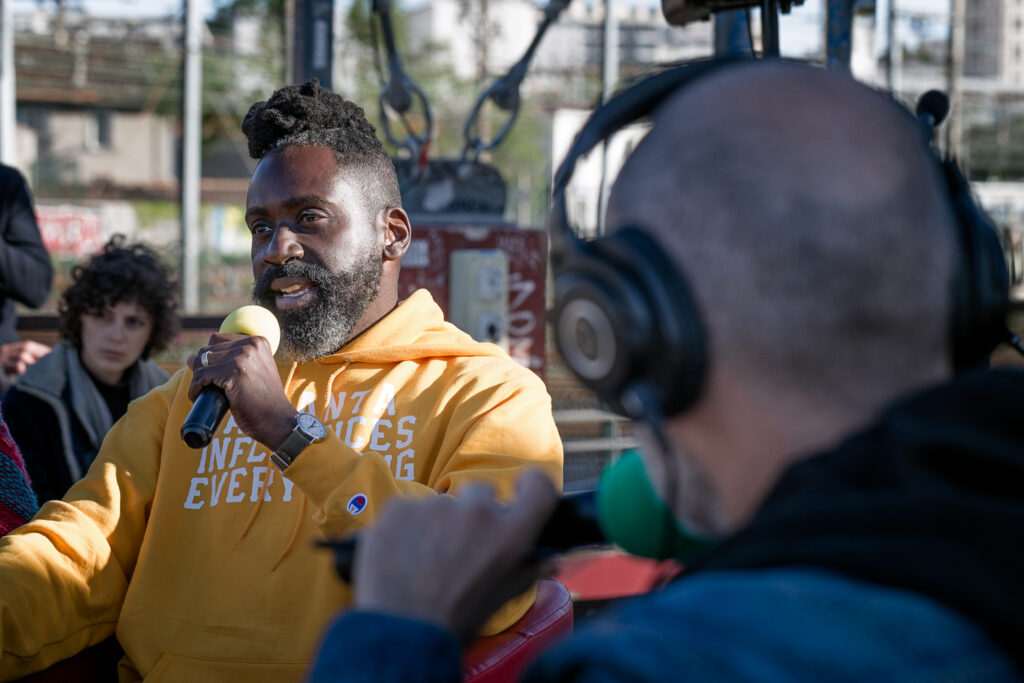
© Pierre-Yves Brunaud
J. Olu Baiyewu is the Urban Agriculture Director for the City of Atlanta and a key part of AgLanta, a digital food hub for the promotion of urban agriculture and food systems from the City of Atlanta’s Office of Sustainability and Resilience, and Department of City Planning. AgLanta cultivates several urban farms, gardens and food forests in the city of Atlanta, and aims to improve community access to freshly grown food by “cultivating a more resilient, equitable, inclusive, just, and accessible food system for Atlanta.” Prior to his work for the City of Atlanta, Baiyewu worked as the Director of Programs and Outreach for Food Well Alliance.
Interview: Laure Gaillard
I was discussing your role as the Head of the Food Service Department within the Agriculture Division of the Metropolis of Marseille. A recent report in 2022 highlighted agriculture as a significant issue for food sovereignty within the metropolis. The institution put forward three proposals, among others, that stood out in the report. The first involves safeguarding and enhancing the use of agricultural lands in the metropolis. These initiatives are underway. How are they progressing?
Honestly, we’re very honored to follow Atlanta. Indeed, the first proposal aims to focus on the territory of the metropolis and the department more broadly, because, in fact, we have been addressing the issue of food since 2018 as part of a territorial food project. And, as we said this afternoon, we are a consumption basin. We have 2 million people to feed in the territory. And the production basin, as you can see, is not here in the city. It’s in the Camargue, in the Pays d’Arles. So, in fact, we’ve broken down administrative barriers a bit and teamed up with the people from Pays d’Arles. There is a dynamic, a cooperation with the production basin. For people coming from Georgia, it’s true that Marseille is very urban, very concrete. But all around Marseille, we have what we call peri-urban areas. And there are many small villages, many agricultural plains. So, we are in a very particular territory, specialized in market gardening and large-scale agriculture, with a bit of livestock farming in the Camargue, and of course, rice. Since 2018, we’ve been focusing on this. The report you mentioned is about food sovereignty, which came about in 2022, after Covid, the war in Ukraine, and all these international issues that have arisen here. During the lockdown, it’s a bit like my colleague from Atlanta described. We didn’t have any stock shortages, but we did have a lot of supply chain issues. We had farmers who couldn’t afford to produce anymore because the labor wasn’t available. That’s something we haven’t talked about at all today. But being a farmer is a tough job. It’s demanding. And we were short of labor. On the other hand, we had markets closing, and we had a very problematic Covid crisis. So, we worked a lot with the agricultural sector at that time, and we started forging new connections to help farmers transport all these fresh, local products. And we distributed 30,000 solidarity baskets during the lockdown. So, we reconnected the countryside and the city, especially the neighborhoods, the Priority Education Areas, as we call them, the politically designated neighborhoods of the city. And we delivered 30,000 food baskets. We were the local authority in France that delivered the most baskets. And it wasn’t with canned goods or processed products; it was with fresh fruits and vegetables from the area. And it was a fantastic chain of solidarity. I’m giving this example because it somewhat represents Marseille and our territorial food project. It’s about agriculture, employment, and protecting agricultural land. Yes, we need to safeguard and activate this agricultural land, or it will be encroached upon. And at the same time, we need to feed the city and, of course, provide quality food accessible to everyone, and mostly, accessible to everyone in our territory.
How many hectares does it take to feed the city of Marseille?
I didn’t mean to spoil the mood.
No, but there are figures to be aware of.
Indeed, when you’re facing convinced individuals, it’s great. You think, it’s fantastic, the short circuits, it’s fabulous. Except that now, we have calculation tools with barbaric names like “craters.”
Are you the one doing the calculations?
It’s not us, but Les Greniers d’Abondance [an association dedicated to studying the vulnerability of contemporary food systems in the face of ecological, climatic and energy upheavals] have worked on such topics. And it still allows, on the scale of a city, to calculate how many agricultural hectares are needed to feed a population. So, in fact, for Marseille, it would take 500,000 hectares. 500,000 hectares to sustain the city. There you go, 800,000 inhabitants. And Marseille covers 23,000 hectares. So, we have a little problem. Therefore, cooperation is necessary. What I really wanted to say is that, on the scale of the food project and in terms of food sovereignty, we really work in cooperation. We try to ensure that everyone works together. We try to empower mayors primarily, since we are a metropolis and therefore support the municipalities. It’s a bit of everything we’ve been saying all day: everyone must do their part in their own way, in their own place. And we really work on raising awareness among elected officials, on the ZAN [A net zero artificialization goal part of the “Climate and Resilience” law of August 2021, that aims to take better account of environmental consequences when building and developing land] that is coming. We have yet another barbaric name. But that’s the idea. It’s really about protecting agricultural lands that have been encroached upon. But at the same time, it’s also the logic of a metropolis and an institution like this. Housing needs to be created. New projects need to be developed. The road system needs to be improved. There are always plenty of projects. And so, agriculture used to come as just another project and was not necessarily a priority. So, the idea of a food project or sovereignty is to work in cooperation with all stakeholders to truly and systematically change the food system.
Are there still many available, viable lands for agricultural projects?
Yes, there are. You have to go looking for them. They’re not in the city, they’re a bit outside. They’re not all easily accessible. But yes, there are; there’s possibility for people who want to settle.
What’s the share of organic farming in the agriculture’s department?
We’re well positioned, almost in the top 3, thanks to viticulture as well. It’s a positive figure, thanks also to viticulture, which has done a lot of work on pesticides. We also support farmers with Technical Study Centers (CETA). It’s true that it’s easy to give instructions and say that everyone should switch to organic. It’s not always easy, it’s not always simple. Farmers need support because they already have a heavy workload. Farming is demanding, it’s rigorous. Right next door, there are farmers we’ve installed in Marseille, who are young, full of energy, and doing very well. But yes, it’s a tough job. It’s very demanding.
But we’ve made some wonderful progress.
Yes.
And we will continue.
Of course. We fully promote short circuits.
Thank you, Laure Gaillard, Head of the Food Service at the Agriculture Department of the Metropolis of Marseille.
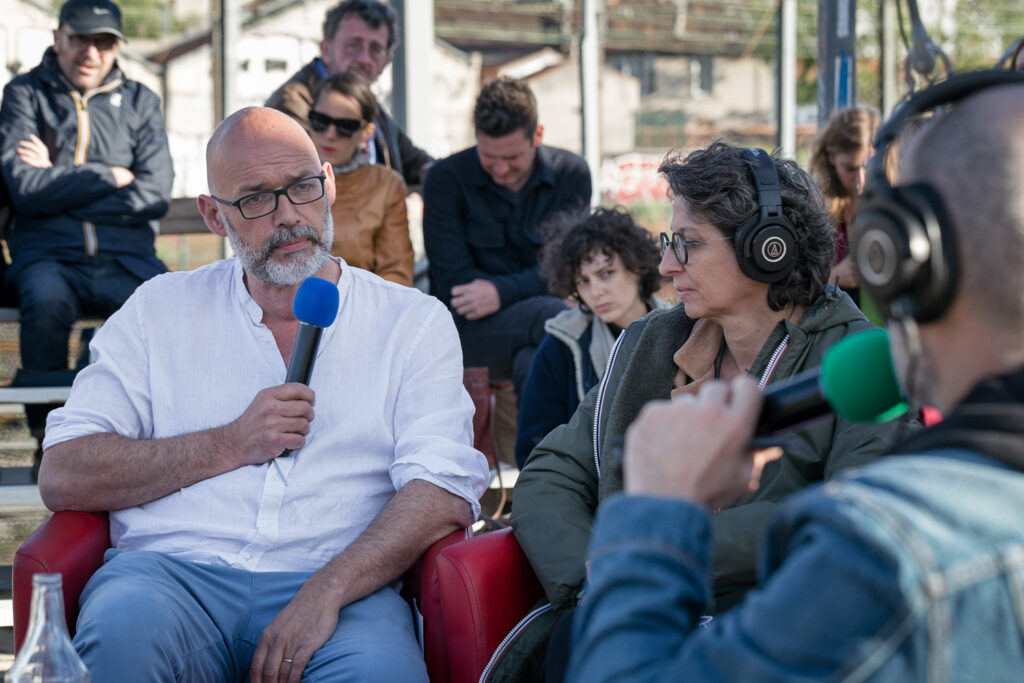
Laure Gaillard, Director of Sustainable Food Service, Métropole Aix-Marseille-Provence

